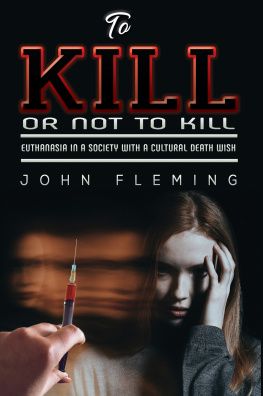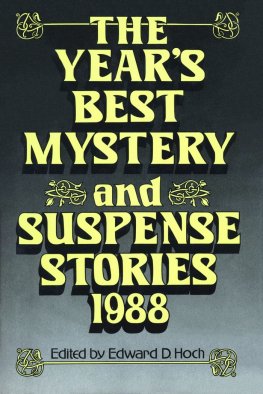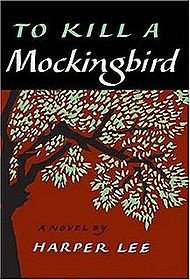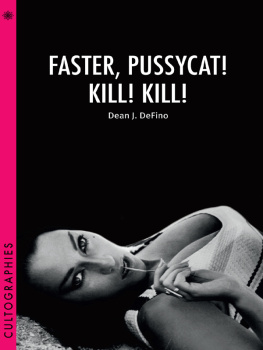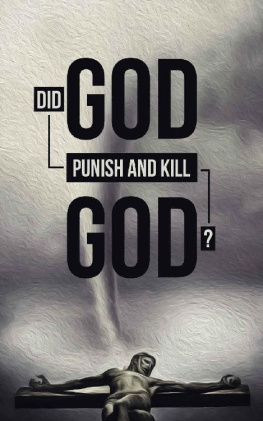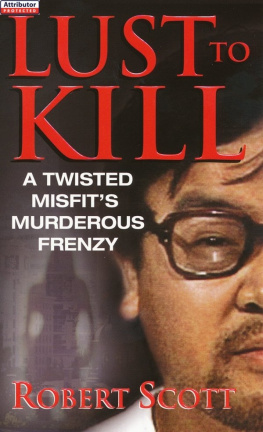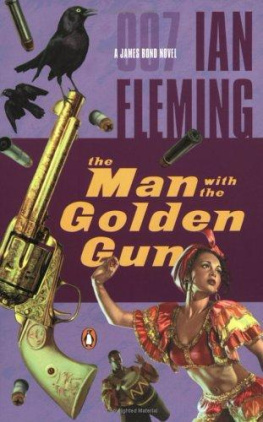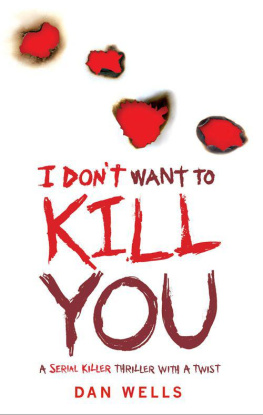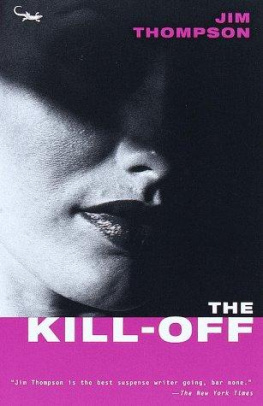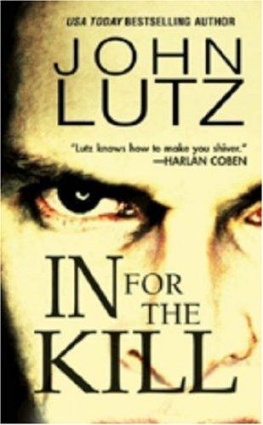T o K ill o r N ot t o K ill
E uthanasia i n a S ociety w ith a
C ultural D eath W ish
John Fleming
Austin Macauley Publishers
2021-06-30
To Kill or Not to Kill
About the Author
John Fleming is a 77-year-old retired academic. After completing his undergraduate degrees in politics and psychology, he completed his PhD at Griffith University in 1992 in philosophy and medical ethics.
He was Foundation Director of Adelaides Southern Cross Bioethics Institute, 1987-2004, a foundation member of UNESCOs International Bioethics Committee (1993-1996), and has served on many Federal and State government policy advisory committees in Australia. He was an elected delegate to the Australian Constitutional Convention (1998), a member of the Council of the National Museum of Australia, from 2003-2009, and Foundation President of Australias first tertiary liberal arts college, Campion College, Old Toongabbie, Australia (2004-2009). He was a Corresponding Member of the Pontifical Academy for Life (Vatican) between 1996-2016. He is the author of nine books and many articles on bioethics and public policy.
Dedication
This book is dedicated to my wife, Alison; to our children, Rebecca, Jane and Jessica; to their spouses, Kieran and Andrea and to our grandchildren, James, Peter and Yolanda.
Copyright Information
John Fleming (2021)
The right of John Fleming to be identified as author of this work has been asserted by the author in accordance with section 77 and 78 of the Copyright, Designs and Patents Act 1988.
All rights reserved. No part of this publication may be reproduced, stored in a retrieval system or transmitted in any form or by any means, electronic, mechanical, photocopying, recording or otherwise, without the prior permission of the publishers.
Any person who commits any unauthorised act in relation to this publication may be liable to criminal prosecution and civil claims for damages.
A CIP catalogue record for this title is available from the British Library.
ISBN 9781528970525 (Paperback)
ISBN 9781528970556 (ePub e-book)
www.austinmacauley.com
First Published (2021)
Austin Macauley Publishers Ltd
25 Canada Square
Canary Wharf
London
E14 5LQ
Acknowledgement
This book has been several years in the writing. I acknowledge those brave souls who have read the entire text and, where they thought appropriate, made suggestions for improvements. Dr Peter Josephs extraordinary eye for detail not only provided the external auditing necessary for the text of any book but offered several helpful and constructive critical comments which improved certain parts of this text. Archbishop John Hepworth, a retired political scientist from the University of South Australia, offered critical insights into the political argumentation used. Arlene Macdonald read the entire book and provided several suggestions for improvement, all of which were accepted. And, of course, I am indebted to the two eminent professors who have each written a foreword to this book, one from an American standpoint and the other from an Australian standpoint: Professor William Tighe is Professor of History at Muhlenberg College, Allentown, Pennsylvania, USA. Emeritus Professor David Flint OA is a former Chairman of the Australian Press Council and of the Australian Broadcasting Authority and has a distinguished academic reputation in economic law and the Australian Constitution.
Stylistic points to note
Within quotations, all emphases in bold are added by this author unless otherwise specified.
Within quotations of other peoples work, sentences which are both emphasised in bold and occur within squared brackets, [], are comments about that work by the author of this book.
In the general text, emphases in the authors own text will be either in italics or bold.
Foreword 1
William J. Tighe
Dr Fleming has written a book that will become required reading for all concerned by, or simply interested in, the propagation and spread of the practice of active euthanasia throughout the world, as well as an evaluation of its subject. I termed the work a book, for so it is, and a long one, but it is really a dissertation (in the old sense of the word, not the modern academic one: a comprehensive treatment of its subject, including its history, context and implications), as it examines and presents the legal, medical, philosophical, religious and social contexts in which advocacy for legally-permitted euthanasia has become a widespread and successful reality in the world today, along with an analysis and critique. In its analytical rigor, its clear focus and its success in delivering the goods it calls to mind, and resembles, the works of critique of the late Anglican academic and theologian Eric Lionel Mascall (19051993).
This brief foreword is not the place for a summary of the subjects treated in the book; Dr Fleming has, in any case, done that in his introduction. Readers will nevertheless find several themes which, at first glance, do not seem to have any obvious connection with euthanasia: historical obliviousness and distortion (chapters. 2 and 5); the ideology of secularism as a new proselytizing and persecuting religion, and one which sanctions lying secularist taqiyya on its behalf and which actively inculcates the attenuation of freedom of speech (chapter 3); contempt for and ignorance of Philosophy as an intellectual discipline (chapter 4); misunderstanding separation of Church and State in terms of both its origins and its purpose (chapter 6) and redefining, and so undermining democracy (chapter 7), to mention the most significant.
Particularly important among them is a chapter (chapter 10) on eugenics, which traces the close historical and ideological connections between eugenics, euthanasia and scientific racism, as well as illuminating the manner in which many genuine scientists, geneticists especially, refrained from voicing their doubts about the qualification of eugenics as a science out of respect for their eugenicist friends and colleagues. Shorn of its associations with racism, many eugenicists continue to promote their quest for a scientific utopia of their own creation and remain committed, and often influential, advocates of population control through political and financial coercion, including abortion and euthanasia as means towards that end; nothing much has changed (p. 441), as Dr Fleming concludes concerning eugenicists division of human beings into persons and dispensable non-persons (pp. 78, 158, 310-11).
These ancillary matters comprise slightly more than half the length of the book, which then turns to euthanasia for its residue primarily in Australia, as befits a treatment by an Australian bioethicist, but by way of the Netherlands and Belgium. They may appear initially to readers as bye-ways to the subject of euthanasia, but in fact, they are essential to situate it as a cultural and social phenomenon in the contemporary world, and its advocacy as an lite and media-driven political and propaganda campaign.
John Irving Fleming was born in Port Lincoln, South Australia, in 1943. Ordained in 1970 in The Church of England in Australia (now The Anglican Church of Australia) he became a Catholic in 1987 and was ordained a priest in The Catholic Church in 1995. In 1995, he received the PhD degree from Griffith University, Queensland, for a thesis on the relationship between Human Rights and Natural Law. He has worked professionally both as a bioethicist and in commercial media over a period of 35 years. As a bioethicist, he has served as a Corresponding Member of the Pontifical Academy for Life (Vatican City) from 1996 and was a Sessional Lecturer in the faculty of the John Paul II Institute for Marriage and the Family (Melbourne) from 20012008. He has also been involved in public-policy decision making. He was the Foundation Director of Southern Cross Bioethics Institute (Adelaide) from 1987 to 2004, during which time, he served on many Australian federal and state government policy advisory committees. He was from 1993 to 1996 a member of UNESCOs International Bioethics Committee, whose work culminated in the Universal Declaration on the Human Genome and Human Rights of 1997. From 2004 to 2009, he was President of Campion College Australia, and from 2004 Adjunct Professor of Bioethics at Southern Cross Bioethics Institute. Through his work in commercial media, his organization of conferences, lectures, submission of briefs to legislative committees, service on panels and at workshops, not to mention the publication of eight books on bioethics and numerous articles, Dr Fleming was able to exert considerable influence on the way bioethical issues could be conceptualised and then actualised in government policy.

